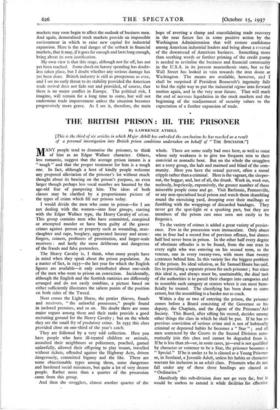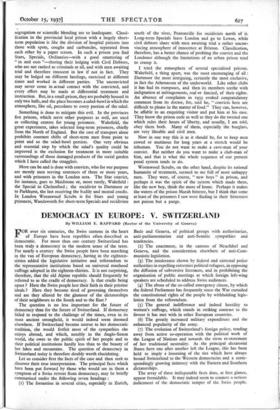THE BRITISH PRISON: IH. THE PRISONER
By LAWRENCE ATHILL
[This is the third of six articles in which Major Athill ha; embodied the con:lusions he has reached as a result of a personal investigation into British prison conditions undertaken on behalf of "Ti-re SPECTATOR."] MANY people tend to dramatise the prisoner, to think of him as an Edgar Wallace character. Others, less romantic, suggest that the average prison inmate is a " tough " and that the proper treatment for him is a tough one. In fact, although a host of kindly people welcome any proposed alleviation of the prisoner's lot without much thought about its bearing on the prison's purpose, an even larger though perhaps less vocal number are haunted by the age-old fear of pampering him. The ideas of both classes may be clarified by a proportionate picture of the types of crime which fill our prisons today.
I would divide the men who come to prison—for I am not dealing with the women—into four groups, starting with the Edgar Wallace type, the Heavy Cavalry of crime. This group contains men who have committed, conspired or attempted murder or have been guilty of the graver crimes against person or property such as wounding, man- slaughter and rape, burglary, aggravated larceny and arson : forgers, coiners, profiteers of prostitution, and larger-scale receivers : and lastly the more deliberate and dangerous of the frauds and false pretenders.
The Heavy Cavalry is, I think, what many people have in mind when they speak about the prison population. As a matter of fact, in 1935—the last year for which the English figures are available—it only contributed about one-sixth of the men who went to prison on conviction. Incidentally, although the English and the Scottish statistics are differently arranged and do not easily combine, a picture based on either sufficiently illustrates the salient points of the position on both sides of the Tweed.
Next comes the Light Horse, the pettier thieves, frauds and receivers, " the unlawful possessors," people found in inclosed premises, and so on. No doubt there are some major rogues among them and their ranks provide a good recruiting ground for the Heavy Cavalry ; but on the whole they are the small fry of predatory crime. In 1935 this class provided close on one-third of the year's catch.
They are followed by a very odd collection. Here you have people who have ill-treated children or animals, assaulted their neighbours or policemen, poached, gamed unlawfully, allowed their offspring to play truant, travelled without tickets, offended against the Highway Acts, driven dangerously, committed bigamy and the like. There are some objectionable types among them, some dangerous and hardened social nuisances, but quite a lot of very decent people. Rather more than a quarter of the procession came from this group.
And then the stragglers, almost another quarter of the whole. There are some really bad ones here, as well as some whose only weakness is to give too frequent rein to their convivial or nomadic bent. But on the whole the stragglers are a sorry group, the halt and maimed and blind of the com- munity. Here you have the sexual pervert, often a moral cripple rather than a criminal. Here is the vagrant, the sleeper- out, the beggar, and, last of all, the drunk. Week in, week out, uselessly, hopelessly, expensively, the greater number of these miserable people come and go. Visit Barlinnie, Pentonville, or any non-specialised local prison and watch them shambling round the exercising yard, drooping over their mailbags or fumbling with the wrappings of discarded bandages. They never get the spot-light or a speaking part, but they are members of the prison cast once seen not easily to be forgotteo.
To the variety of crimes is added a great variety of persist- ence. Few in the procession were immaculate. Only about one in four had a record free of previous offence, but almost half had never been in prison. In the other half every degree of obstinate offender is to be found, from the one man in every eight who was entering on his second term, to the veteran, one in every twenty-two, with more than twenty sentences behind him. In this variety lies the biggest problem of the prison. Its ideal solution, as Sir Samuel Hoare has said, lies in providing a separate prison for each prisoner ; but since this ideal is, and always must be, unattainable, the dual task of the authorities is to parcel their charges into categories and to assemble each category at centres where it can most bene- ficially be treated. The classifying has been done to some extent, but the assembling is a harder nut to crack.
Within a day or two of entering the prison, the prisoner comes before a Board consisting of the Governor or his deputy, the Chaplain, and the Agent of the Prisoners' Aid Society. This Board, after sifting his record, decides among other things the class in which he shall be put. If he has no previous conviction of serious crime and is not of habitually criminal or depraved habits he becomes a " Star " ; and all men sentenced by the Courts to the Second Division auto- matically join this class and cannot be degraded from it. If he is less than 26—or, in some cases, 30—and is not qualified by character or sentence to be a Star, the prisoner becomes a " Special." If he is under 21 he is classed as a Young Prisoner or, in Scotland, a Juvenile Adult, unless his habits or character warrant his inclusion in an adult class. Prisoners who do not fall under any of these three headings are classed as "Ordinaries."
Manifestly this sub-division does not go very far, but it would be useless to extend it while facilities for effective segregation or scientific blending are so inadequate. Classi- fication in the provincial local prison with a largely short- term population is like the division of hospital patients into those with spots, coughs and carbuncles, separated from each other by a paper screen. In such a prison you find Stars, Specials, Ordinaries—with a good smattering of "in and outs "—sharing their lodging with Civil Debtors, who are not ranked as criminals at all, and with men awaiting trial and therefore innocent in law if not in fact. They may be lodged on different landings, exercised at different times and worked in different parties. The unconvicted may never come in actual contact with the convicted, and every effort may be made at differential treatment and instruction. But, in a small prison, they are probably housed in only two halls, and the place becomes a salad-bowl in which the atmosphere, like oil, percolates to every portion of the salad.
Something is done to mitigate this evil. In the provinces five prisons, which serve other purposes as well, are used as collecting centres for young prisoners. Wakefield, the great experiment, takes selected long-term prisoners, chiefly from the North of England. But the cost of transport alone prohibits constant shifts of short-term men from point to point and so the salad-bowl persists. One very obvious and essential step by which the salad's quality could be improved is the exclusion for treatment in more suitable surroundings of those damaged products of the social garden which I have called the stragglers.
More can be and is done with convicts, who for our purpose are merely men serving sentences of three or more years, and with prisoners in the London area. The Star convict, for instance, goes to Maidstone or, more rarely, Wakefield : the Special to Chelmsford ; the recidivist to Dartmoor or to Parkhurst, the last receiving the badily and mental crocks. In London Wormwood Scrubs is for Stars and young prisoners, Wandsworth for short-term Specials and recidivists south of the river, Pentonville for recidivists north of it. Long-term Specials leave London and go to Lewes, while civil debtors share with men awaiting trial a rather uncon- vincing atmosphere of innocence at Brixton. Classification, therefore, has a better chance of profiting the convict and the Londoner although the limitations of an urban prison tend to cramp it.
I tried the atmosphere of several specialised prisons. Wakefield, a thing apart, was the most encouraging of all : Dartmoor the most intriguing, certainly the most exclusive, in fact the Athenaeum of the underworld. Like other clubs it has had its rumpuses, and then its members seethe with indignation at infringements, real or fancied, of their rights. An absence of complaints in 1935 evoked congratulatory comment from its doctor, for, said he, "convicts here are difficult to please in the matter of food." They can, however, be affable to an enquiring visitor and put him at his ease. They know the prison code as well as they do the twisted one which rules their hours of liberty, and usually, I am told, obey them both. Many of them, especially the burglars, are very likeable and civil men.
Now in one way this is as it should be, for to keep men cowed or mutinous for long years at a stretch would be inhuman. You do not want to make a cave-man of your convict. But neither do you want to make a club-man of him, and that is what the whole sequence of our present penal system tends to do.
Wormwood Scrubs, on the other hand, despite its rational humanity of treatment, seemed to me full of most unhappy men. They were, of course, "new boys" in prison, and perhaps it was the spirit of the system which made them, like the new boy, think the more of home. Perhaps it makes the waters of the prison Marah bitterer, but I think that some at least of the prisoners I saw were finding in their bitterness not poison but a purge.























































 Previous page
Previous page